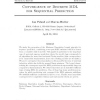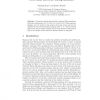1414 search results - page 6 / 283 » Randomness and Universal Machines |
COLT
2004
Springer
15 years 5 months ago
2004
Springer
We study the properties of the Minimum Description Length principle for sequence prediction, considering a two-part MDL estimator which is chosen from a countable class of models....
111
click to vote
ALT
1997
Springer
15 years 3 months ago
1997
Springer
Efficient learning of DFA is a challenging research problem in grammatical inference. It is known that both exact and approximate (in the PAC sense) identifiability of DFA is har...
COLT
2005
Springer
15 years 5 months ago
2005
Springer
We consider a natural framework of learning from correlated data, in which successive examples used for learning are generated according to a random walk over the space of possibl...
102
click to vote
FCT
2009
Springer
15 years 6 months ago
2009
Springer
We give small universal Turing machines with state-symbol pairs of (6, 2), (3, 3) and (2, 4). These machines are weakly universal, which means that they have an infinitely repeate...
110
click to vote
MCU
2007
15 years 1 months ago
2007
We present small polynomial time universal Turing machines with state-symbol pairs of (5, 5), (6, 4), (9, 3) and (18, 2). These machines simulate our new variant of tag system, the...


